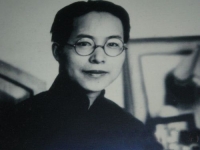现代中国
(
1902年12月28日~
1988年5月10日)
 沈从文
沈从文(1902~1988)现代作家、历史文物研究家。原名沈岳焕,笔名小兵、懋琳、休芸芸等。湖南凤凰(今属湘西土家族苗族自治州)人。苗族。1918年小学毕业后随本乡土著部队到沅水流域各地,随军在川、湘、鄂、黔四省边区生活,开始接触中外文学作品。1923年到北京自学并学习写作。曾去北京大学旁听。1924年后开始发表作品,并与胡也频合编《京报副刊》和《民众文艺》周刊。1928年到上海与胡也频、丁玲编辑《红黑》、《人间》杂志。翌年任教于中国公学。1930年起在武汉大学、青岛大学任教。1934年起编辑北平和天津的《大公报》副刊《文艺》。抗日战争爆发后,到昆明任西南联合大学教授。抗战胜利后,任北京大学教授,编辑《大公报》、《益世报》等文学副刊。从1926年出版第一本创作集《鸭子》开始,沈从文出版了7O余种作品集,被人称为多产作家。至40年代刊行的作品主要有:短篇小说集《蜜柑》、《雨后及其他》、《神巫之爱》、《旅店及其他》、《石子船》、《虎雏》、《阿黑小史》、《月下小景》、《如蕤集》、《八骏图》,中篇小说《一个母亲》、《边城》,长篇小说《旧梦》、《长河》,散文集《记胡也频》、《记丁玲》、《从文自传》、《湘行散记》、《湘西》等。他的小说取材广泛,描写了从乡村到城市各色人物的生活,其中以反映湘西下层人民生活的作品最具特色。代表作《边城》以兼具抒情诗和小品文的优美笔触,表现自然、民风和人性的美,提供了富于诗情画意的乡村风俗画幅,充满牧歌情调和地方色彩,形成别具一格的抒情乡土小说。他的创作表现手法不拘一格,文体不拘常例,故事不拘常格,尝试各种体式和结构进行创作,成为现代文学史上不可多得的“文体作家”。他的散文也独具魅力,为现代散文增添了艺术光彩。一些后来的作家曾深受他创作风格的影响。
中华人民共和国成立后,沈从文被安排到中国历史博物馆,从事文物、工艺美术图案及物质文化史的研究工作。1957年放弃了文学生涯。1978年调中国社会科学院历史研究所任研究员,致力于中国古代服饰及其他史学领域的研究。研究成果有《唐宋铜镜》、《龙凤艺术》、《中国古代服饰研究》等学术著作。1980年曾应邀赴美国讲学,1982年增补为中国文联委员。沈从文的著作除前面列举的外,还有论文集《沫沫集》、《废邮存底》、《云南看云集》,批评专集《现代中国作家评论选》,以及多种沈从文的选集和多卷本《沈从文文集》等。
(1902 ~ 1988) of modern writers of historical relics home. Formerly known as Shen Yue Huan, pen soldier, Mao Lin, Yun-yun, etc. off. Hunan Phoenix (now part of Western Hunan Tujia and Miao Autonomous Prefecture) people. Miao. After graduating in 1918 with the primary to the Yuanshui River Hongo indigenous forces around the army in Sichuan, Hunan, Hubei, and Guizhou border area of life, came into contact with Chinese and foreign literary works. Beijing in 1923 to write self-study and learn. Peking University had to attend. Works published after 1924, and edited with the Hu-frequency "Beijing Daily News", and "public art" magazine. 1928 frequencies to Shanghai and Hu, Ding Ling edit "red and black," "human" magazine. The following year taught at public school. 1930, at Wuhan University, Qingdao University of Pennsylvania. 1934, Beijing and Tianjin from the editors of "Ta Kung Pao" Supplement "Literature." War broke out, to any of Southwest Associated University in Kunming. After the war, he was appointed professor at Peking University, Editor, "Ta Kung Pao", "Yi World Report" and other literary supplement. From the 1926 publication of the first creation series "ducks" start, Shen 7O kinds of works published collection, was known as a prolific writer. Print and Publish to 40 years of work are: short stories, "mandarin", "after the rain and the other", "Mystery of Love", "Hotel and other", "stone boat", "young tiger", "A Short History of Black "" On the Small King, "" such as Rui set "," Eight Horses "novella" a mother, "" Border Town ", novel" dream, "" river "essays" are written Hu-frequency "" Notes on Ding Ling, "" From the Autobiography "," Hunan Travelogue, "" Western "and so on. He draws on extensive description of the colored people from rural to urban living, which reflecting the lower Western works of the most unique people's lives. Representative of "Border Town" to both the beautiful lyrics and Essays strokes, the performance of the natural, and the people and the beauty of human nature, provides a rich poetic village custom frame, full of pastoral mood and local color, form a unique lyrical Novels. Eclectic approach to his creative expression, style informal common practice, the stories often informal format, trying to create a variety of style and structure, rare in modern literary history "style writer." His prose is also charming, as the art of modern prose adds luster. Some later writers have deeply affected his writing style.
